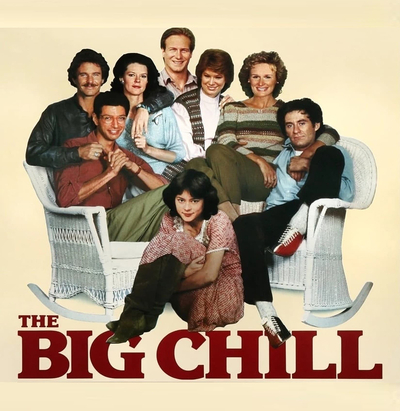Late last year, Fortune magazine announced a major milestone due in 2024 – the year when Gen Zers will outnumber Baby Boomers in the workplace. This doesn't signal a changing of the guard: according to the story, "Millennials will still reign supreme (even if some of their corporate relics like WeWork and Glossier are losing favor) for the next couple of decades."
Boomers, Fortune tells us, dominated the workplace until 2011. Their successors in Gen X only managed to have "a brief time in the sun until 2018" and Millennials took over after that and are expected to dominate the workplace until 2040. The story speculates on how this changing of the guard will affect businesses ("younger generations are more likely to want to talk about politics and issues of diversity and inclusion than their older cohorts" so be prepared for more of this for years to come) but the message is simple: the era of the Boomer is over.
Which seems as good a time as any to go back to the moment when the Baby Boom got its hands firmly on the wheel of the culture, if not the boardroom. The latter, some say, came after Bill Clinton (born 1946) won his first term as US president; the former arrived years earlier, with the release of The Big Chill in 1983.
The year marked two decades since the assassination of John F. Kennedy and the release of the first Beatles records, and a decade since the end of the draft in the US. The '80s were the decade when the Boomers entered middle age, and this is where writer and director Lawrence Kasdan (born 1949) has a group of college friends who've drifted apart reunite for the funeral of Alex (Kevin Costner, born in 1955, and cut almost entirely from the picture).
Once the ringleader of a group of housemates and student radicals at the University of Michigan, he commits suicide in the bathroom of a South Carolina country house belonging to Harold and Sarah (Kevin Kline and Glenn Close, both born 1947). The friends who converge on their Sea Islands antebellum mansion includes Meg (Mary Kay Place, born 1947), a successful Atlanta real estate lawyer, and Michael (Jeff Goldblum, born 1952), a People magazine writer.
Sam (Tom Berenger, born 1949) is an actor and star of a TV detective show clearly based on Magnum P.I.. Karen (Jobeth Williams, born 1948) is a Detroit housewife married to an advertising executive while Nick (William Hurt, born 1950) is a drifter and drug dealer who arrives late for the funeral in his beat up 1972 Porsche 911T.
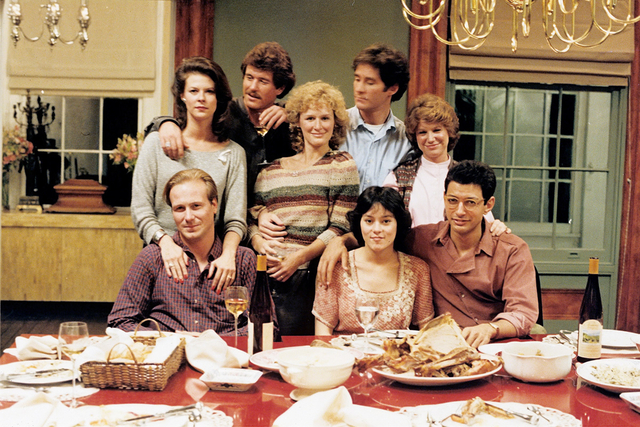
Sensing the grief and regret overwhelming his friends, Harold invites them all to stay for the weekend at their country house, with its two stories of wide balconies nestled among trees covered in Spanish moss. This sets up a story that the Hollywood Reporter described as "clearly intended as a searching commentary on the change in values between the idealism of the '60s and the crass materialism of today."
The film begins, however, with the sound of children – specifically Harold and Sarah's young son in the bathtub of their other home in Richmond, Virginia. He sings Three Dog Night's "Joy to the World" while his father soaps him up; the boy has been raised to the soundtrack of his father's youth – later when Michael complains about the all-oldies playlist on the turntable, Harold states firmly that "there is no other music in my house."
Children – the earliest Millennials – are a peripheral presence in The Big Chill. We see a few at the funeral and Karen talks about her young sons at home, while Sam complains about losing the connection with his daughter after his divorce. And then there's the child Meg plans to conceive with one of her old roommates during the weekend if they're willing; she's burned out after two decades of dating and frightened by the sound of her biological clock. The ground is fertile, she tells Sarah, now she just needs a farmer to sow the seed.
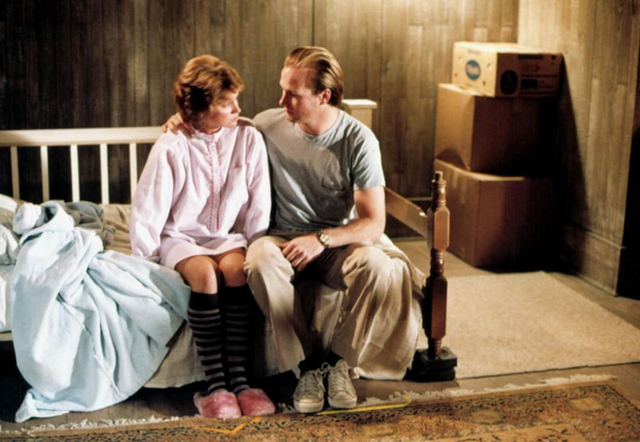
But once the funeral guests leave and the reunion begins there is one other young person in the midst of the group: Chloe, the young girlfriend of Alex who found his body, played by Meg Tilly (born 1960). She's the outsider meant to put the group in some kind of context, though Tilly plays her as so passive and spacey that she only registers as a reminder that they are now, whether they want to admit it or not, the adults in the room.
It's a role they all seem either unwilling or unable to assume in varying degrees. This is made clear with the brief encounters the group have with Karen's husband, Richard (Don Galloway). Karen sought refuge from a difficult childhood with a man who looks and acts like he's from a different generation. (Galloway was born in 1937), and the stolid, buttoned-down Richard is apparently the polar opposite of her father.
After meeting her old friends for the first time he seems disappointed and tells her that they're nothing like how she described them. Later that night when Sam and Nick find Richard tending his insomnia with a midnight snack, he muses that kids are "instant priorities – you know you have to protect them and provide for them and sometimes that means your life isn't exactly the way you want it to be."
"You set your priorities. That's the way life is," he tells Sam and Nick. "I wonder if your friend Alex knew that...But the thing is, nobody said it was going to be fun. At least nobody said it to me."
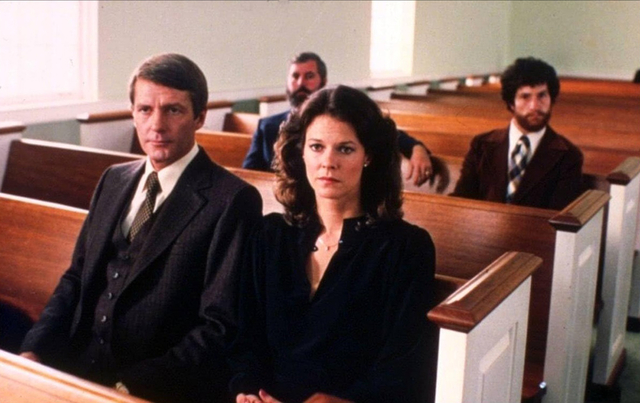
The two men stare at Richard in the darkened kitchen while he eats his mayonnaise sandwich with a mix of curiosity, confusion and irritation. In any case he's gone the next morning, leaving his wife and her friends to their own thoughts.
These short scenes have made Richard something of a hero to conservatives writing about the film. Writing in the National Review, Kyle Smith calls Richard "the secret hero of the film", and since Galloway plays him as "a hopeless corporate dweeb... it doesn't sink in with either the audience or the other characters that he has the surest grip on life: You make the best of whatever situation you find yourself in. What you don't do is agonize about failing to live up to some unreachable ideal."
Smith goes one step further:
Richard understands how Sixties idealism wound up being a kind of lingering afterburn that made everybody itchy and unhappy. He has more of a Greatest Generation understanding that life is about tradeoffs: "But the thing is, nobody said it was gonna be fun. At least nobody said it to me." The former student revolutionaries around him sit in stunned silence: Of course life is supposed to be fun! And romantic and irresponsible and hedonistic and free of commitment. Except the movie we are watching is a 100-minute lesson in why none of that works.
It's hard to know how Kasdan expects us to react to Richard's admission that he's out of step with the '60s zeitgeist of self-realization at all costs. When I saw the film the first time it seemed like we were supposed to feel sorry for him, but that was forty years ago and my perspective has changed.
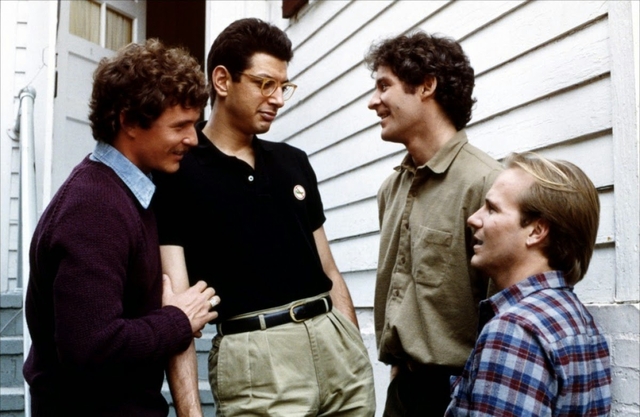
I saw The Big Chill for the first time at the 1983 Toronto film festival where it was the big buzz, winning a viewer's choice award that helped build up anticipation for what turned out to be a box office smash. I wasn't quite twenty, just out of high school, and I remember feeling envious that this generation was allowed to represent itself so eloquently onscreen, with such obvious confidence that they'd have a receptive audience large enough to drown out the sizable minority of viewers who'd complain that they were just witnessing the bellyaching of disappointed idealists.
I knew even then that nobody would care about the travails of my own demographically insignificant generation, growing up in the considerable wake of the Boomers. I was impressed that nobody would even try to contradict Harold's boast that his generation produced the best music ever recorded.
(His boast was certainly backed up by numbers, and the film's soundtrack album went platinum six times, earning massive profits for Motown, who released a follow-up record padded out with tunes that weren't in the movie.)
But mostly I was envious of the obvious prosperity that this group of self-styled former revolutionaries were enjoying, prime among them Harold and Sarah. Sarah is a doctor, while Harold has built up a small but successful chain of twenty-eight athletic shoe stores with the coyly Maoist name Running Dog. (The entrepreneurial Harold obviously got in on the ground floor with his generation's obsession with fitness and lifestyle brands.)
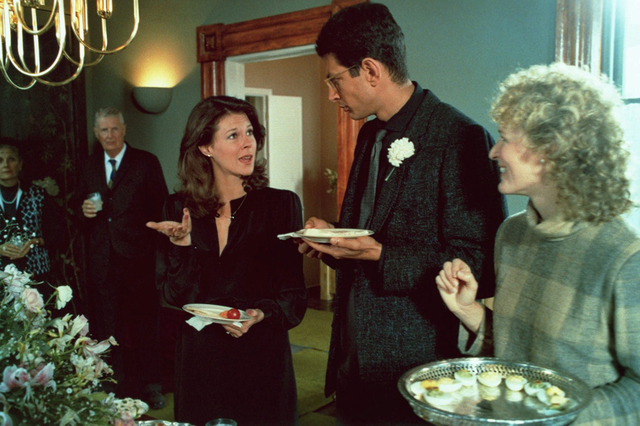
Their Tidewater antebellum mansion with its balconies and ancient trees – played by Tidalholm, built in 1853 by plantation owner Edgar Fripp – is vast and tastefully furnished, with enough space for all of their friends to stay the weekend (even though Michael has to sleep in their son's airplane bed). He tips off Alex that his little company is about to be bought out by a much larger one and that their stock will triple in value, violating several SEC laws.
Sam and Meg have done well, and Karen has married well, and while we get a glimpse of Michael and his girlfriend in a tiny New York apartment at the beginning of the film, he has a staff position at People writing celebrity profiles to a maximum of 32 paragraphs, or "anything longer than the average person can read during the average crap." But old-timers will remember how well journalism could pay back before word rates froze in the '90s. As Kyle Smith writes:
I picture 25-year-old journalists who are lucky to get paid to write a story of one-third that length wanting to zap Goldblum with the Melt Stick he used in Thor: Ragnarok, and that's before anyone tells them about the extravagant salaries that People writers used to command, which would probably cover about six HuffPost writers today. What exactly has this guy got to complain about? Maybe he should stop cheating on his girlfriend and just be a good magazine writer instead of confusing himself with Albert Camus.
The only outlier is Nick, who came back from Vietnam with a wound that rendered him sexually impotent and ended up following the same aimless life as Alex, for whom he assumes the role of moral stand-in when the weekend's conversation turns maudlin and self-accusing.
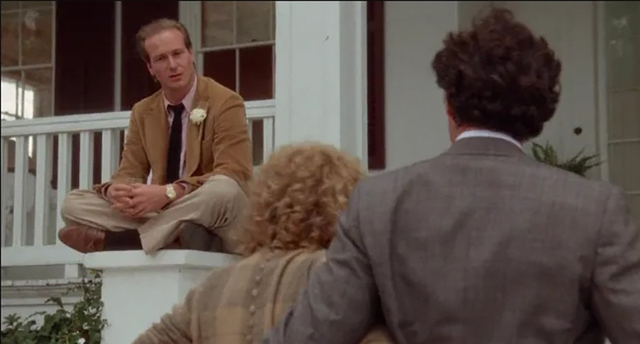
After a few screenings of Kasdan's film I started playing a little game of "Who voted for Reagan?", since it's mathematically certain that at least one member of the little group did. Nick certainly didn't; with no fixed address outside his Porsche, it's unlikely he voted at all in 1980. Hollywood actor Sam didn't, nor did Michael, judging by the Village Voice t-shirt he wears in one scene.
Meg might have; Reagan's economy surely benefited her law practice. But I imagine her disappointment with herself after fleeing a job as a public defender ("My clients were the scum of the earth - extreme repulsivos. One of them got caught in the house. He and his friends beat up the husband, rape the wife...then tried to blow the place up...I just didn't think they'd be so guilty.") for a corporate job ("El Greedo strikes again.") left her with just enough longing for her lost idealism to cast a vote for Jimmy Carter, or maybe John Anderson.
Richard definitely voted for Reagan, and Karen probably told her husband she did as well, while secretly voting for Carter. Close's Sarah looks for all the world like a Carter voter, which leaves Harold. At one point during an argument over their lost radical ideals he becomes exasperated with his friends, calling them "bleeding hearts." His little Maoist joke aside, he looks happy with his life and his two houses, one of them built by a slave owner.
Later in the film Nick drives home followed by a police car. He'd run a light and cussed out the local cop when he was stopped, but Harold talks the cop out of pressing charges despite his (correct) intuition that Nick looks like a drug dealer from the north. Nick calls his friend out, asking him when he became so friendly with cops.
"First off, that cop has twice kept this house from being ripped off. Happens to be a hell of a guy," Harold explodes at Nick. "What is it with you? Is jail another 'experience' you want to 'try?' See what that's 'like?' You know, I live here. This place means something to me. I'm dug in. I don't need this shit."
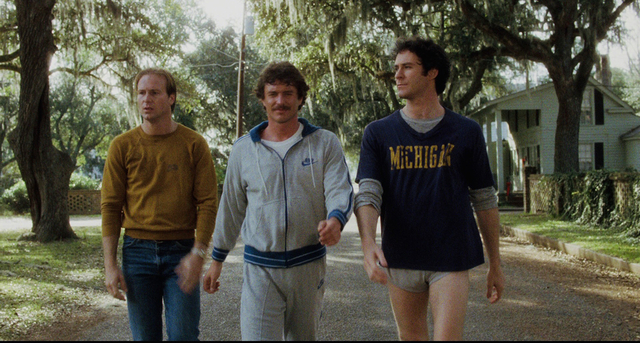
So yeah, I'm pretty sure Harold voted for Reagan. And that while his wife knew he did, they didn't end up making it a big thing, probably because of the affair Sarah had with Alex five years previous.
Which leaves us with The Big Chill's cringey sexual politics. There were two taglines on original posters for the film; one read "In a cold world you need your friends to keep you warm." The other was a quote from Kline's Harold: "How much love, sex, fun and friendship can a person take?"
Communal student living had meant the usual thing back in Ann Arbor, and the friends had shared history: Sam had a thing for Karen while she was with Nick, and Michael and Meg had a one-night stand during the March on Washington. Sarah and Harold took on the roles of mother and father, despite a lingering mutual attraction between Sarah and Alex which turned physical years later, when she got "sick of being such a good girl."
Karen arrives for the weekend with a vague plan to see if Sam is still attracted to her; Meg is looking for a willing "farmer" and Michael shows up with condoms in his bag. The only person on the outside is Nick, though not by choice. At some point between having sex with Sam on the ground in the dark and driving to the airport the next morning Karen goes from leaving Richard and moving to Los Angeles to asking Sam if he can get Richard and the boys on a studio tour next time they're on the coast. As designated comic relief, Goldblum's Michael is the odd man out, spending the night alone "in my little airplane" despite his best efforts.
I cringed the first time I saw Sarah volunteer her husband to father Meg's child, and I still cringe today; the strange, smug look Close has on her face as she arranges the tryst and surveys everyone the morning after doesn't help.
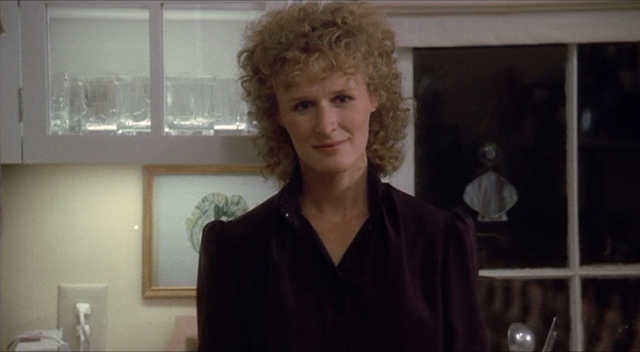
Nick, in spite of his damage, finishes the movie with Chloe – the prize the film had dangled in front of Michael all weekend as not one but two cameras (film and videocam) linger on the 23-year-old former dancer as she does stretching exercise in a leotard.
In her review of the picture Pauline Kael described Tilly's Chloe, saying "there probably should be a little more going on in the character, but she's an extraordinarily lovely presence."
"She's ten to fifteen years younger than the others, and, with her small, delicate features and wide-apart almond eyes, she seems to stand for a generation born shell-shocked and wise – or is it stoned and empty of anything but matter-of-fact considerations?"
It would take a long time for Boomers to understand the generation that followed them, and most of the time the effort seemed perfunctory at best, as they knew that there weren't enough of us to make it worth their while. Chloe is given to wildly inappropriate observations that confuse and even shock the group, and there's an intimation that her upbringing had more than the usual share of trauma, casually inflicted and largely unnoticed.
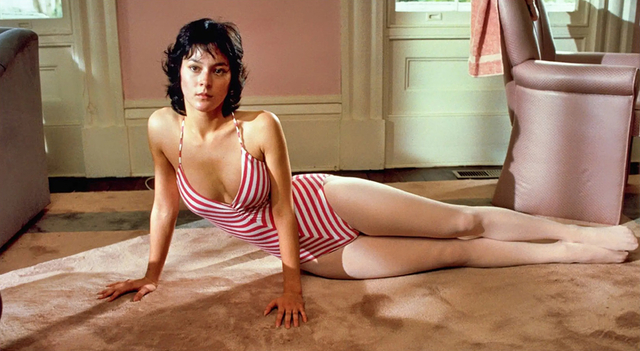
"I don't like talking about my past as much as you guys do," she tells Nick as he interrogates Chloe while filming her doing her stretches with Sarah and Harold's videocam. She parries the group's questions about whether Alex was happy during the time they were together by saying "I haven't met that many happy people in my life. How do they act?"
Even after multiple viewings I find it hard to like most of the characters in The Big Chill, but I've come to the conclusion that this might have been Kasdan's point. Many reviews, while praising the writing and editing and acting, even criticizing it for being so good that it came off as facile, still complain that the ending wasn't satisfying.
Reviewing the film when it came out, Roger Ebert wrote that it was "a splendid technical exercise. It has all the right moves. It knows all the right words. Its characters have all the right clothes, expressions, fears, lusts and ambitions. But there's no payoff and it doesn't lead anywhere."
"I thought at first that was a weakness of the movie. There also is the possibility that it's the movie's message."
Despite myself I still sympathize with Hurt's Nick, the only member of the group who's unwilling to regard their loss of revolutionary idealism and what they called "hope" as a tragedy that will afflict not just them but history itself. "I am so sick of people selling their psyches for a little attention," he tells the group as they argue about Alex again on their last night together – a statement that anticipates so much of the culture of clout and virtue to come.
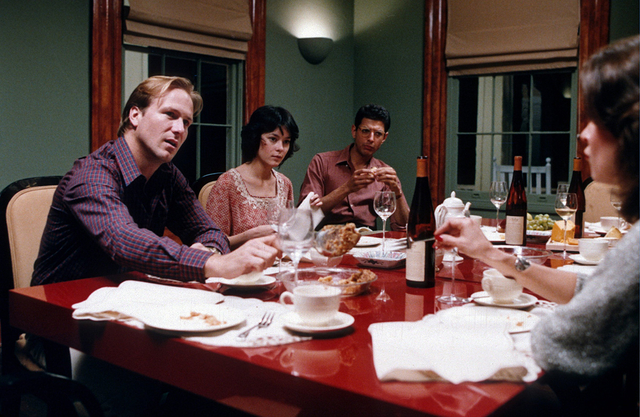
"A long time ago we knew each other for a short period," Nick tells Sam. "You don't know anything about me. It was easy back then. Nobody ever had a cushier berth than we did. It's not surprising our friendship could survive that. It's only out here in the world where it gets tough."
At first Nick's rebuke to his friends seemed needlessly cruel, but I had to put it in the context of a group of adults on the first sunlit uplands of middle age using a friend's suicide as an opportunity to act like they were twenty again, empowered by the Pill and college draft exemptions to imagine that they were going to remake the world and not the other way around.
"What's wrong with you?" Karen asks him. "What's happened to you?" It's the question we all assumed they had come to ask themselves, while in the end only Nick seems willing to accept the fact that change had indeed happened, though not necessarily improvement, that the direction of history is only occasionally upward.
Club members can let Rick know what they think by logging in and sharing in the comments below, as access to the comments section is one of many benefits that comes along with membership in the Mark Steyn Club.

